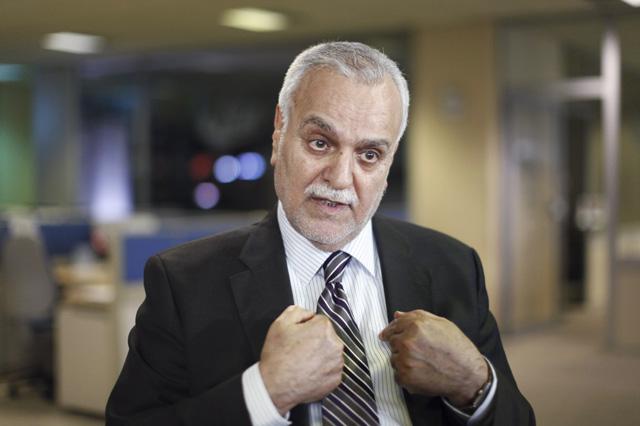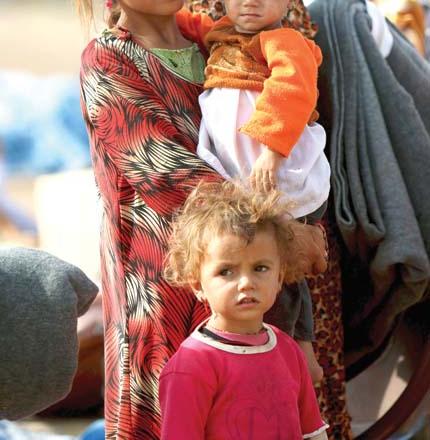You are here
Fugitive Iraqi VP urges role for Saddam loyalists, criticises US action
By Reuters - Aug 18,2014 - Last updated at Aug 18,2014
ISTANBUL — Former leader Saddam Hussein's Baath Party must play a role if a political solution is to be found in Iraq, fugitive vice president Tarek Al Hashemi said on Monday, warning that US air strikes would do nothing to end the violence.
The Iraqi army has been trying to push back Sunni Muslim insurgents from Islamic State and other groups opposed to the Shiite-led government in Baghdad since they launched a lightning advance two months ago.
The United States this month began its first air strikes on Iraq since pulling out all troops in 2011, to support Kurdish fighters also trying to reverse gains by the insurgents, who have overrun much of Iraq's north.
"My country is on the brink of civil war and partition," Hashemi, a Sunni sentenced to death in 2012 after an Iraqi court convicted him of running death squads, told Reuters in an interview in Istanbul.
"The United States summarises the whole dilemma into attacking [Islamic State] only. This is not going to put an end to the Iraqi issue," he said, saying Shiite militias were also guilty of acts of terrorism.
"They shouldn't concentrate on the Sunni extremists, they should take into consideration the Shia as well. They are also terrorists, they are killing, they are displacing people and they are adopting the same [Islamic State] policy and strategy."
Sunni groups including Baath Party loyalists initially rallied behind Islamic State because of a shared hatred for the Shiite-led government, but there have been growing signs of infighting and disagreement over the Al Qaeda offshoot's rejection of Iraq's borders, and severe interpretation of Islam.
Hashemi said "de-Baathification" after the US-led invasion in 2003 which toppled Saddam had caused Iraq to lose well-trained professionals it now badly needed and said it was vital they were brought into the political process.
"They're effective politically and even have armed groups on the ground, they are very active," he said of the banned former ruling party.
"There is only one way to accommodate them, to invite them to sit at the roundtable and be a partner in the [revival] of the political process... in laying down an agreeable vision for the future. They have to be a partner," he said.
‘Step in the right direction’
Hashemi, who denies running death squads while vice president, has long accused former prime minister Nouri Al Maliki of a witch-hunt against Sunni opponents.
Maliki, a Shiite, stepped down last week after criticism that his sectarian policies had encouraged some members of the Sunni minority to join the Islamic State insurgency.
Haider Al Abadi, a fellow Shiite with a less confrontational reputation, has been appointed prime minister-designate to try to form a government including leaders of Iraq's main minorities.
Hashemi welcomed Abadi's appointment as a "step in the right direction" but said it was not enough, calling on him to immediately halt military operations such as air strikes on Falluja, west of Baghdad, which he said were killing innocent Sunni civilians.
"If he wants to send positive messages to Sunni communities, why is he continuing the shelling and bombardment," Hashemi said. "He should immediately put an end to the military aggression which has been started by Nouri Al Maliki."
Hashemi called for the international community, under the auspices of the United Nations, to help oversee the revival of a political process in Iraq rather than focusing simply on the threat from Islamic State fighters, a strategy he said would not deliver long-term stability.
"[Islamic State] is just part of the dilemma. What about the Shia, what about this political process which has been kidnapped by Maliki and drifted," he said.
"After a while the United States is going to discover that they changed nothing with these air strikes," he said.
Related Articles
The violence in Iraq is part of a broader Sunni Arab revolt that could lead to a holy war in the country, and is not just a rampage by Islamist militants from an Al Qaeda splinter group, fugitive Vice President Tarek Al Hashemi told Reuters on Monday.
Kurdish forces said they recaptured Iraq’s biggest dam from Islamist militants on Monday, as the United States launched air strikes to secure what has become a vital strategic objective in fighting that threatens to break up the country.
BAGHDAD — As fighting in Iraq raged last summer, Iranian Major-General Qassem Soleimani came across unexpected opposition to his plans


















